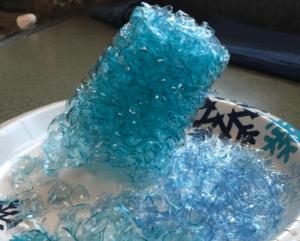 Contact Lens Recycling In Seattle
Contact Lens Recycling In Seattle
Did you know that contact lens recycling IS an option in Seattle? Yes, the plastic blister pack and aluminum foils your contacts come in are actually recyclable! The trouble is, due to their small size, you’re not supposed to put them in with the ‘mixed recyclables’ that our city hauls away. These small bits of recyclable material – and the used lenses themselves – typically end up in a landfill, even if you put them in your recycle bin. Now the doctors at Cannon EyeCare are ready to help with this conundrum. Bausch + Lomb has partnered with TerraCycle to create a free contact lens recycling program for all brands of contact lenses, their foils and blister packs too. Cannon EyeCare’s two Seattle locations are drop-off points for contact lens recycling.
Here’s how it works:
Our patients are welcome to bring their foils, lenses, and blister packs (separated from each other) to our University Village or Pike Place office and drop them off for free. Please leave your cardboard boxes and paper packaging at home, where you can recycle them yourself. If we can motivate you to level up your recycling game, here is what we suggest: Put the foils, plastic blister packs, and lenses in separate bags, and then bring them in once full. There’s no need to clean the lenses after taking them off of your eyes. There is no cost to use this service at Cannon EyeCare, but we do ask that only our current patients use this free service.
Once our special contact lens recycling bin fills up, we ship it to TerreCycle, where they further sort and then melt down the materials to make new products or packaging. We hope you will participate in this program so we can reduce our collective impact on the environment by reducing the amount of contact lens waste deposited in landfills across the country. Plus, for every 10 pounds of contact lens recyclables shipped to TerraCycle, Bausch + Lomb will donate a dollar to the Optometry Giving Sight charity.
Should you select monthly replacement or Daily Disposable contact lenses?
We like to take time to discuss the plusses and minuses of daily disposable contacts vs monthlies with our patients. There are lots of good arguments in favor of daily disposable lenses, such as:
- Convenience (no need to clean them or keep track of right vs left lens)
- Fresh lenses each day feel better and are safer because they’re sterile
- You won’t need a cleaning solution unless you drop the lens on the floor
- Eliminating cleaning solutions typically improves eye health
The downsides to dailies are:
- If you wear them more than 3-4 times a week, Dailies will cost more per year than monthlies
- More packaging waste than monthlies…but we can help with the associated guilt
- Not all powers are available in the dailies, though this is improving over time
Contacts should NOT go down the toilet or sink!
Maybe you’ve seen the news about the problem of “micro-plastics” being a major source of pollution in the ocean. Flushing your contacts down the toilet directly contributes to this issue. Please don’t put plastic in the ocean. Used contacts can go in the trash. Or ideally, they get recycled.
Plenty of parents of teens have learned from their local plumber that contacts will clog your sink drain if you wash them down the sink. If they do make it through the plumbing, your sink won’t clog but you’ve effectively tossed them into the ocean.
Running a GREEN Medical Practice – not just Contact Lens Recycling
Dr. Mark Cannon bikes into work nearly every day to reduce our carbon footprint. We try to reduce packaging and other waste and reuse things until they are used up.
Compost & recycling – hauled home on Dr. Mark’s bike. Compost and recycling bins are commonplace at Seattle homes, but most offices (medical or otherwise) don’t compost or recycle. Our practice goes the extra mile, hauling the recyclables and compost to our own bins at home for proper sorting. We even compost our shredded paper.
Join us on this initiative and you too can reduce your impact on the environment. Working with our Green Medical Practice is a great way to reduce your carbon footprint. Spread the message about contact lens blister-pack recycling and you can take part in saving the environment for all future generations.
Get an appointment with our eye specialists and chose from several services such as:
EyeGlass Exams
Eye Exam for Contacts
Dry Eye Evaluation and Management
Glaucoma Evaluation and Management
Medical Eye Exam
Forensic Eye Exams
Pediatric Eye Exams (age 5+)
Co-management of Cataract, Lasik, and PRK surgery
Canon Eye Care is here to help solve all your eye care problems and give you the best health care services possible! Get in touch with us and get an appointment today!
